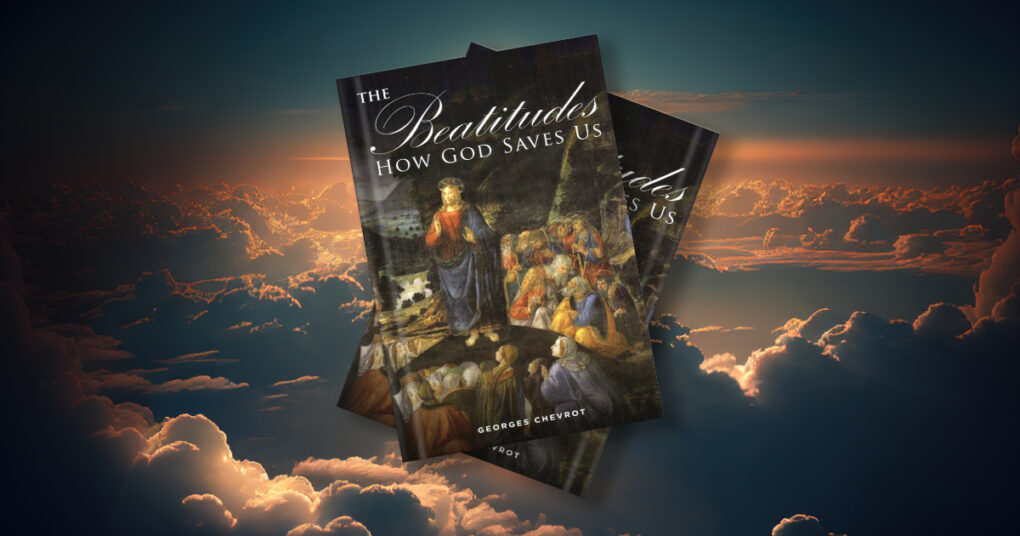The Beatitudes: How God Saves Us
Georges Chevrot
Scepter
2022 (Revised Edition)
148 pages
ISBN: 978 1594174636
Though it first appeared as a book, based on Fr Chevrot’s sermons over sixty years ago, this treatise on the Beatitudes is as relevant as ever in today’s world where it can come across as counter cultural.
The author separately lists the Beatitudes as they appear in Matthew (5:3-12) and Luke (6:20-26) and makes a number of comparisons between the two. In each they are at the beginning of the Sermon on the Mount. We must remember that Matthew was writing for a Jewish audience who were familiar with Old Testament writings, unlike the Greeks for whom Luke was writing.
For a small book, it has no less than thirty chapters, most of them very short but many of them offering details of what the various Beatitudes mean which might not be apparent at first glance. While dealing with the first Beatitude in the chapter on detachment, he has a message for Christian parents:
The benefits of a Christian education will never be fully praised, provided it is not a façade. But if is not the education of poverty, it is Christian only in name. Give your children sound instruction, and if it is possible, a wide culture, but also develop in them nobility of feeling and accustom them to simplifying their desires.
Do not allow them to squander money which they have not earned.
A parent of young children whom I know confided recently that she felt her parenting skills were going in the right direction when, during Christmas just gone by they had only given books to their children and they were very happy. (They have built up a large collection of toys over the years!)
Dealing with the second Beatitude, “Blessed are the meek for they shall inherit the earth”, there is a lovely paragraph which states:
[T]oo many souls bypass Christianity without realizing that it is a school of energy. The meekness and humility which are inseparable from him are the surest signs of strength and self-possession. Blessed are the meek because they know how to rule themselves; their self-mastery will win them mastery over the world.
And in the next chapter entitled “Masters of the Earth”, we are reminded of Christ’s words to the apostles: [A]ll authority in heaven and on earth has been given to me. Go therefore and make disciples of all nations (Mt 28:18-19). And the author tells us we must win the whole world for him and that the meekness of Christians will by itself succeed in making the world Christian. He mentions the great conquerors who were on the point of being masters of the world – Nebuchadnezzar, Alexander and Augustus who could ravage the land but could not succeed in dominating the world. Like some modern day megalomaniacs, one could add.
Chevrot devotes four chapters to the third Beatitude. In Matthew this is “Blessed are those who mourn, for they shall be comforted” while in Luke, we have “Blessed are you that weep now for you shall laugh” which indeed Luke follows up with “Woe to you who laugh now, for you shall mourn and weep. While obviously these contrasts refer to the rewards for those who suffer in this life, joy is the normal atmosphere for Christians and Chevrot develops this point with reference to St Francis of Assisi, St Teresa of Avila and even St Joan of Arc while a prisoner in Rouen.
At the beginning of his chapter on Christian joy, Chevrot states:
The third beatitude states a general rule: in all circumstances, Jesus can turn the affliction of his disciples into joy. In fact joy is the normal atmosphere for Christians.
He goes on to highlight how the angels bring tidings of “great joy” that a saviour has been born to the world; Jesus compares His ministry to a wedding feast and presumably radiated happiness when He blessed the little children and likewise even when His passion was near, when He said to the apostles that His joy would fill their hearts and that no one will be able to take it from them.
The fourth Beatitude in Matthew is “Blessed are those who hunger and thirst for righteousness, for they shall be satisfied”. Chevrot, with amazing prescience develops this in anticipation of the Second Vatican Council’s declaration of the universal call to holiness which was promulgated in Lumen Gentium less than a decade after his death. The righteousness which the Blessed seek is nothing short of holiness through virtues, though we can only strive for holiness in this life but should all have it as our aim – otherwise we will sink into mediocrity.
The remaining chapters develop ideas on mercy, presence of God, the quest for peace (so relevant at the time of writing this) and how blessed we are when people revile us on His account, but the short book ends with a chapter entitled “The Christian’s Victory” where heaven is the promise and the extent of God’s mercy will be revealed.
All in all, a short book but one that shows the huge depth in some very short apparently simple one liners. The writer of the preface to the new edition quotes former US President Harry S. Truman’s comment: “I doubt if there is any problem in the world today – social, political, or economic – that could not find a happy solution if approached in the spirit of the Sermon on the Mount.
About the Author: Pat Hanratty
Pat Hanratty taught Science/Chemistry in Tallaght Community School from its inception in 1972 until he retired in 2010. He was the school’s first Transition Year Co-ordinator and for four years he had the role of Home School Community Liaison Officer.

